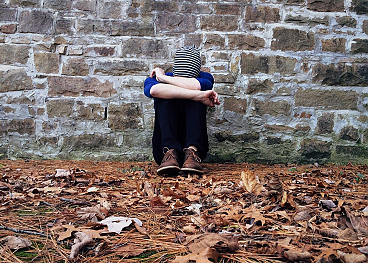
Oct 3, 2017 | Non categorizzato
Detached wires “In the first months of our marriage, dialogue between my husband and me was often interrupted due to the diversity of our opinions. A times, after rather harsh verbal clashes we would reach a total silence also for days. Returning from work for lunch the short break was occupied by the news on TV which Gaetano listened to with passion. One day, confiding in God’s help, I decided to send him a clear message: I returned home early from school and prepared a delicious lunch. The table was prettier than ever with flowers and a lit candle. Then I pulled out all the wires of the TV. Upon arriving Gaetano was amazed and asked me if there was some anniversary to celebrate. We sat down at the table and as always, he tried to turn on the TV but immediately saw that it had nothing to do with a fault. Laughing he hugged me, begging forgiveness, and together we promised to correct one another always out of love. That was an important moment of growth in our relationship.” (Giulia – Italy) In the kitchen «During my shift in the kitchen, I couldn’t stand my co-friars who would taste all that I was cooking upon passing by. Every time I became increasingly defensive so they would not touch anything. One day, upon reading the phrase of the Gospel about the speck in the other’s eye and not seeing the log in your own, I realized that the judgment I had of my co-friars was hindering me from loving them. Since then every time someone passed in the kitchen, I would invite him to taste my cooking and ask his advice on whether, for example, I had to add more salt and so on. Since then the atmosphere in the monastery has changed.” (Fr. Krzysztof – Poland)  To love means taking risks «Some time ago an illiterate 15-year-old boy, already initiated in the activity of theft, started to frequent our home. Many had advised us to be careful in letting him in and to consider if it would not be better to help him but keep him at a distance. We were, however, convinced that Jesus was in him and that we had to love concretely, also to the point of taking a risk. Often that boy remained with us, went out with us and played with our children. After various months, the stealing instinct returned and he stole some money from us. After the first denials he admitted the fact and crying, begged for forgiveness, promising to return what he stole. But above all he became serene knowing that he could continue to count on our friendship and that if he ever needed money, all he had to do was ask. Now he no longer steals and has also found a job.” (D. L. – Italy) Difficult colleague “It seemed that a colleague had started picking on me, and whatever I did, he would go against it. For as long it had to do with small counteraction, I bore up with it. But at times, in the face of important commitments, he would go against everyone. Work had become unbearable. What could I do? The priest I spoke to advised me firstly to free myself from grudges and negative thoughts and try to see my colleague with new eyes. I tried it. Incredibly, at the next work meeting, he had become another person altogether! And evidently it not only depended on him.” (F. L. – Serbia)
To love means taking risks «Some time ago an illiterate 15-year-old boy, already initiated in the activity of theft, started to frequent our home. Many had advised us to be careful in letting him in and to consider if it would not be better to help him but keep him at a distance. We were, however, convinced that Jesus was in him and that we had to love concretely, also to the point of taking a risk. Often that boy remained with us, went out with us and played with our children. After various months, the stealing instinct returned and he stole some money from us. After the first denials he admitted the fact and crying, begged for forgiveness, promising to return what he stole. But above all he became serene knowing that he could continue to count on our friendship and that if he ever needed money, all he had to do was ask. Now he no longer steals and has also found a job.” (D. L. – Italy) Difficult colleague “It seemed that a colleague had started picking on me, and whatever I did, he would go against it. For as long it had to do with small counteraction, I bore up with it. But at times, in the face of important commitments, he would go against everyone. Work had become unbearable. What could I do? The priest I spoke to advised me firstly to free myself from grudges and negative thoughts and try to see my colleague with new eyes. I tried it. Incredibly, at the next work meeting, he had become another person altogether! And evidently it not only depended on him.” (F. L. – Serbia)
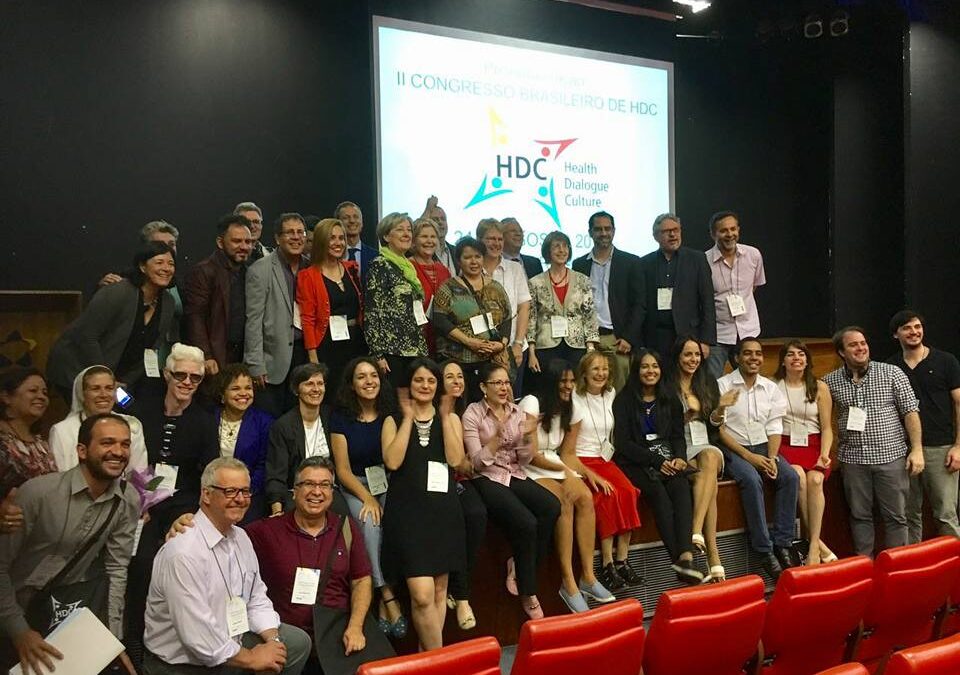
Oct 2, 2017 | Focolare Worldwide
 Health as a common good and sustainability of care systems are topics healthcare operators have to face worldwide, especially with the progressive increase of the average life expectancy and the increased need for care. How can the sick be assisted in an effective and likewise sustainable manner? And also: is there a correlation between spirituality and the global health of a person? These were the themes discussed in the convention organised by the Health Dialogue Culture, an international network of healthcare practitioners established in 2003 to contribute through a vital dialogue with science, to a culture that respects life and the dignity and integrity of every person, in the perspective of the promotion of social and individual health. Inspired by the charism of unity of the focolare Movement, Health Dialogue Culture offers room for reflection in connection with practice, from which guidelines are to be drawn as a contribution to the debate on the need to create new paradigms for the healthcare systems. The congress was held as a continuing program with other previous events on the same theme, and particularly with the one held in Padua (Italy) in 2013, entitled What medicine: across globalization, sustainability and personalization of treatments, and with the Letter of Ethics which gathered the results.
Health as a common good and sustainability of care systems are topics healthcare operators have to face worldwide, especially with the progressive increase of the average life expectancy and the increased need for care. How can the sick be assisted in an effective and likewise sustainable manner? And also: is there a correlation between spirituality and the global health of a person? These were the themes discussed in the convention organised by the Health Dialogue Culture, an international network of healthcare practitioners established in 2003 to contribute through a vital dialogue with science, to a culture that respects life and the dignity and integrity of every person, in the perspective of the promotion of social and individual health. Inspired by the charism of unity of the focolare Movement, Health Dialogue Culture offers room for reflection in connection with practice, from which guidelines are to be drawn as a contribution to the debate on the need to create new paradigms for the healthcare systems. The congress was held as a continuing program with other previous events on the same theme, and particularly with the one held in Padua (Italy) in 2013, entitled What medicine: across globalization, sustainability and personalization of treatments, and with the Letter of Ethics which gathered the results. 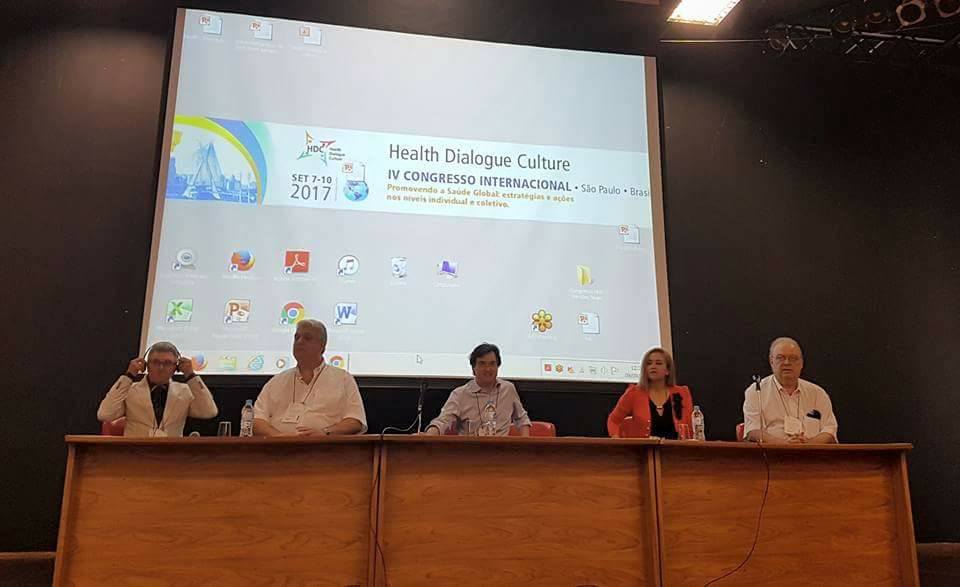 Among the new paradigms for the treatment of the sick person, the relational dimension is taking on an increasingly strategic role, that is, the set of relations at multiple levels (with the patients, among healthcare practitioners, and with the institutions) that revolve around the care issue. Long ignored in the drawing up of socio-healthcare models, also the spiritual dimension, wherever applied, has a substantial impact on the quality of life and the treatment outcomes. The Sao Paolo congress offered a structured programme with reports, labs, workshops, sharing of experiences and good practices, with a fruitful discussion on new methodologies to reach equity and accessibility to healthcare services at local and global levels. «The real challenge of this convention – the organisers said – was the cultural and professional wealth due to the variety of speakers and participants (over 270) and their coming from countries with the most diverse healthcare standards such as Congo, Cameroon, Norway, Venezuela, Chile, Paraguay, Uruguay, Benin, Amazon, Brazil, Dominican Republic, Spain, the UK, Italy and Austria. Particular attention was paid to the themes of disability, ageing, the methods in treating pain and suffering through palliative treatments and the training of operators (care for the caregivers).
Among the new paradigms for the treatment of the sick person, the relational dimension is taking on an increasingly strategic role, that is, the set of relations at multiple levels (with the patients, among healthcare practitioners, and with the institutions) that revolve around the care issue. Long ignored in the drawing up of socio-healthcare models, also the spiritual dimension, wherever applied, has a substantial impact on the quality of life and the treatment outcomes. The Sao Paolo congress offered a structured programme with reports, labs, workshops, sharing of experiences and good practices, with a fruitful discussion on new methodologies to reach equity and accessibility to healthcare services at local and global levels. «The real challenge of this convention – the organisers said – was the cultural and professional wealth due to the variety of speakers and participants (over 270) and their coming from countries with the most diverse healthcare standards such as Congo, Cameroon, Norway, Venezuela, Chile, Paraguay, Uruguay, Benin, Amazon, Brazil, Dominican Republic, Spain, the UK, Italy and Austria. Particular attention was paid to the themes of disability, ageing, the methods in treating pain and suffering through palliative treatments and the training of operators (care for the caregivers). 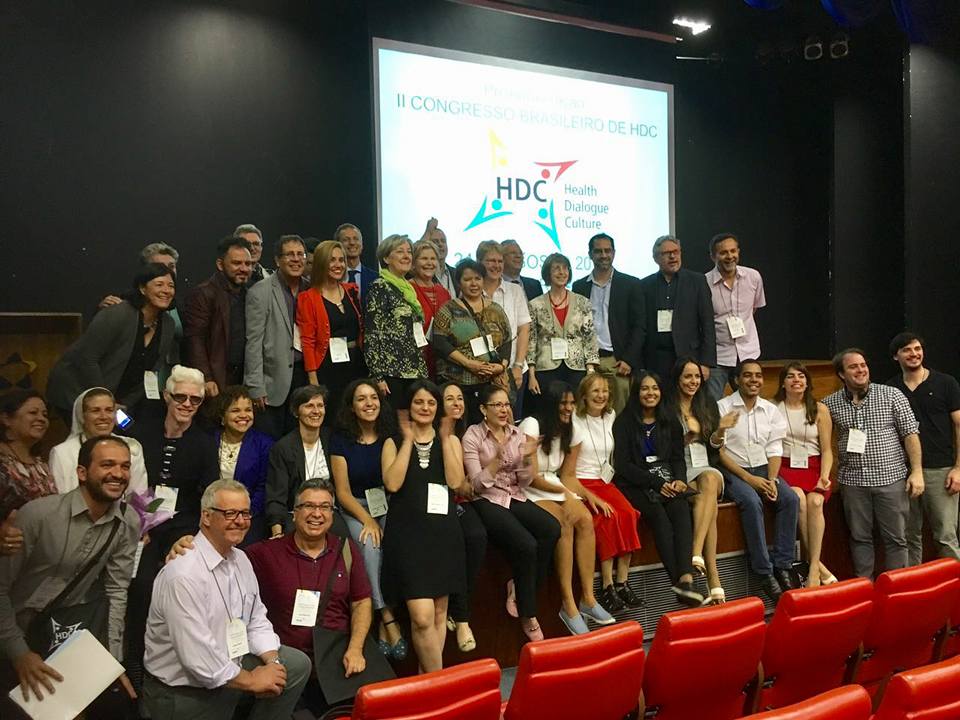 A specific programme was activated during the Congress with interactive sessions for students and young professionals of the biomedical area. A young student of medicine commented at the end of the works: “This congress has changed my ideas on medicine, with new ideas that make me a better person, and with the certainty that they also will make me a better professional.” A Brazilian doctor: “Science is not cold and distant. We have learned that we can practice science without forgetting the essence which unites us: Love.” Maria Voce, Focolare President, sent a message to the participants with the wish that they would “live their professions with a love that generates fraternity, all tending towards the good of the human family.” She recalled a phrase of Chiara Lubich was recalled: «Equilibrium of love lies in loving each single person next to us and working for the entire community from our own corner of life.”
A specific programme was activated during the Congress with interactive sessions for students and young professionals of the biomedical area. A young student of medicine commented at the end of the works: “This congress has changed my ideas on medicine, with new ideas that make me a better person, and with the certainty that they also will make me a better professional.” A Brazilian doctor: “Science is not cold and distant. We have learned that we can practice science without forgetting the essence which unites us: Love.” Maria Voce, Focolare President, sent a message to the participants with the wish that they would “live their professions with a love that generates fraternity, all tending towards the good of the human family.” She recalled a phrase of Chiara Lubich was recalled: «Equilibrium of love lies in loving each single person next to us and working for the entire community from our own corner of life.”

Oct 1, 2017 | Non categorizzato
 The International Day of Older Persons is celebrated on 1 October every year, as established by the United Nations in 1990. The objective is to heighten awareness of the issues regarding the elderly and show appreciation for their contribution to society. According to the World Health Organization, in 2050 the world population of people over 60 will reach 2 billion. The phenomenon of longevity will, however, involve most of the countries worldwide with strong repercussions on economic and social life. The elderly represent not only a cost, especially in terms of assistance, but they also contribute greatly to society. It is not surprising, therefore, that the day after (for the Catholic church it is the feast of the Guardian Angels), many countries will honor all grandparents. Without them, authentic “guardian angels” of the family, it would be really difficult for couples to reconcile work and care for their children.
The International Day of Older Persons is celebrated on 1 October every year, as established by the United Nations in 1990. The objective is to heighten awareness of the issues regarding the elderly and show appreciation for their contribution to society. According to the World Health Organization, in 2050 the world population of people over 60 will reach 2 billion. The phenomenon of longevity will, however, involve most of the countries worldwide with strong repercussions on economic and social life. The elderly represent not only a cost, especially in terms of assistance, but they also contribute greatly to society. It is not surprising, therefore, that the day after (for the Catholic church it is the feast of the Guardian Angels), many countries will honor all grandparents. Without them, authentic “guardian angels” of the family, it would be really difficult for couples to reconcile work and care for their children.
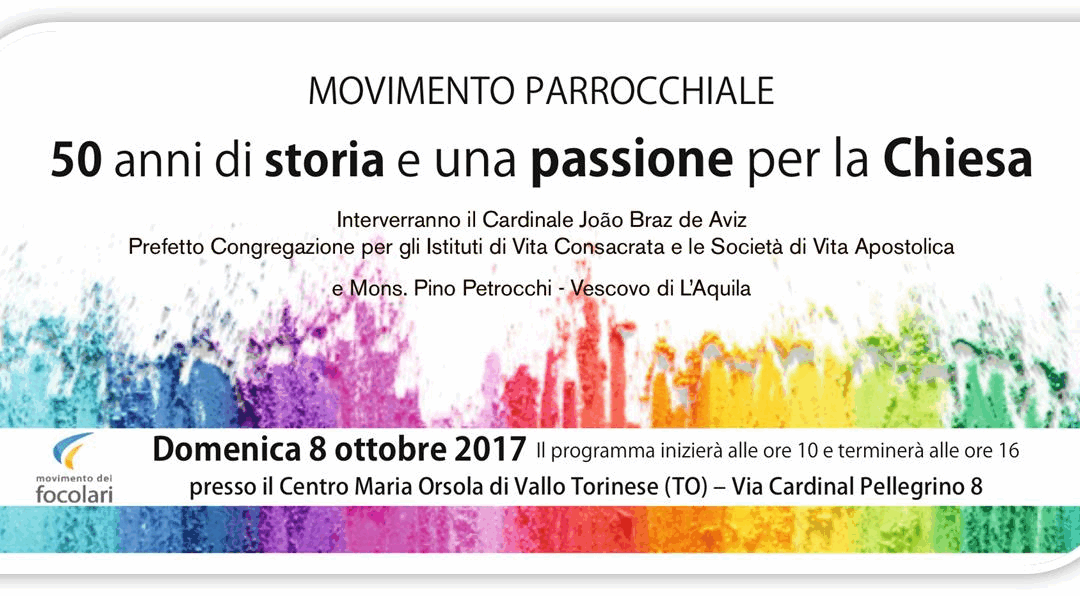
Sep 29, 2017 | Non categorizzato
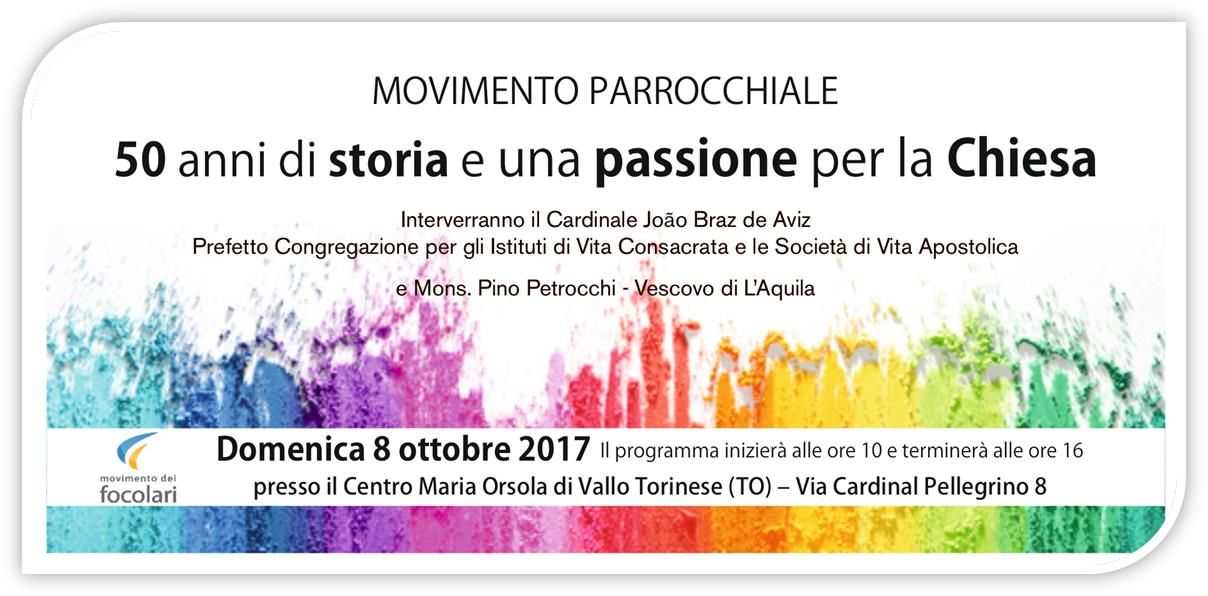 A day-long gathering at Maria Orsola Centre, titled “A Fifty year story of passion for the Church”. Alongside the presentations of a few experiences and artistic interludes, Cardinal Joao De Aviz, prefect of the Congregation for the Institutes of Consecrated Life, once bishop of Brasilia, will give a talk titled From the Peripheries of the World to the Vatican, and Archbishop Giuseppe Petrocchi, bishop of Aquila will talk about The Calling of the Parish Movement in the light of Juvenescit Ecclesia. Press Releases
A day-long gathering at Maria Orsola Centre, titled “A Fifty year story of passion for the Church”. Alongside the presentations of a few experiences and artistic interludes, Cardinal Joao De Aviz, prefect of the Congregation for the Institutes of Consecrated Life, once bishop of Brasilia, will give a talk titled From the Peripheries of the World to the Vatican, and Archbishop Giuseppe Petrocchi, bishop of Aquila will talk about The Calling of the Parish Movement in the light of Juvenescit Ecclesia. Press Releases

 To love means taking risks «Some time ago an illiterate 15-year-old boy, already initiated in the activity of theft, started to frequent our home. Many had advised us to be careful in letting him in and to consider if it would not be better to help him but keep him at a distance. We were, however, convinced that Jesus was in him and that we had to love concretely, also to the point of taking a risk. Often that boy remained with us, went out with us and played with our children. After various months, the stealing instinct returned and he stole some money from us. After the first denials he admitted the fact and crying, begged for forgiveness, promising to return what he stole. But above all he became serene knowing that he could continue to count on our friendship and that if he ever needed money, all he had to do was ask. Now he no longer steals and has also found a job.” (D. L. – Italy) Difficult colleague “It seemed that a colleague had started picking on me, and whatever I did, he would go against it. For as long it had to do with small counteraction, I bore up with it. But at times, in the face of important commitments, he would go against everyone. Work had become unbearable. What could I do? The priest I spoke to advised me firstly to free myself from grudges and negative thoughts and try to see my colleague with new eyes. I tried it. Incredibly, at the next work meeting, he had become another person altogether! And evidently it not only depended on him.” (F. L. – Serbia)
To love means taking risks «Some time ago an illiterate 15-year-old boy, already initiated in the activity of theft, started to frequent our home. Many had advised us to be careful in letting him in and to consider if it would not be better to help him but keep him at a distance. We were, however, convinced that Jesus was in him and that we had to love concretely, also to the point of taking a risk. Often that boy remained with us, went out with us and played with our children. After various months, the stealing instinct returned and he stole some money from us. After the first denials he admitted the fact and crying, begged for forgiveness, promising to return what he stole. But above all he became serene knowing that he could continue to count on our friendship and that if he ever needed money, all he had to do was ask. Now he no longer steals and has also found a job.” (D. L. – Italy) Difficult colleague “It seemed that a colleague had started picking on me, and whatever I did, he would go against it. For as long it had to do with small counteraction, I bore up with it. But at times, in the face of important commitments, he would go against everyone. Work had become unbearable. What could I do? The priest I spoke to advised me firstly to free myself from grudges and negative thoughts and try to see my colleague with new eyes. I tried it. Incredibly, at the next work meeting, he had become another person altogether! And evidently it not only depended on him.” (F. L. – Serbia) 






